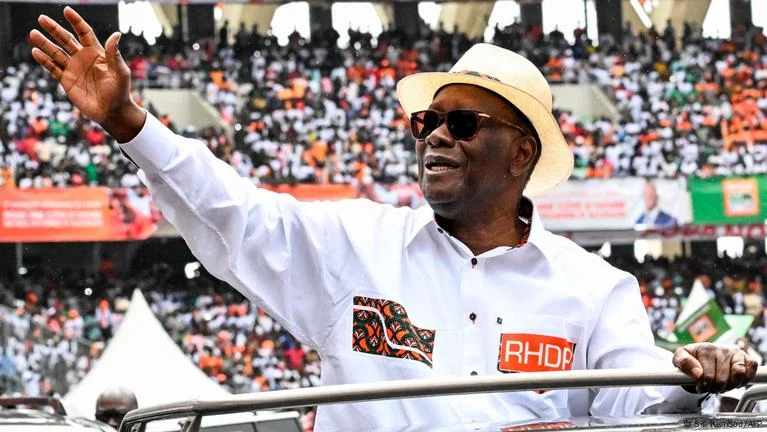On October 20, 2025, a gendarme was fatally shot while patrolling in southern Ivory Coast, a region known for strong opposition support, just days before the October 25 presidential election.
The attackers remain unidentified, but the area has seen recent unrest following the disqualification of two prominent opposition candidates, Laurent Gbagbo and Tidjane Thiam. The incident has intensified fears of violence as the nation braces for a contentious vote.
President Alassane Ouattara, 83, seeking a fourth term, now faces four opposition contenders: Simone Gbagbo, Ahoua Don Mello, Jean-Louis Billon, and Henriette Lagou.
The government has banned all protests, citing security concerns, though candidate rallies remain unaffected.
Political Crackdown and Unrest
The southern region, a hotspot for opposition activity, has been turbulent since Gbagbo and Thiam were barred from running. Protests erupted, with demonstrators accusing authorities of rigging the electoral process to favor Ouattara’s ruling party.
The government’s protest ban aims to curb further unrest, but it has drawn criticism for stifling dissent. Supporters of the opposition candidates continue to hold campaign events, navigating the restrictions to rally voters.
The killing of the gendarme underscores the volatile atmosphere. Authorities have yet to name suspects, but the incident has heightened public unease, with fears that election-related tensions could escalate further.
Ouattara’s Leadership in Focus
Since taking office in 2011, Ouattara has prioritized large-scale infrastructure projects, transforming Ivory Coast’s roads and urban centers. However, critics argue these developments have not addressed soaring inequality and rising living costs, which have hit ordinary Ivorians hard. Many feel left behind, fueling resentment toward the government.
Opposition leaders also criticize Ouattara’s close ties to France, the country’s former colonial power. They accuse him of aligning too closely with foreign interests, a charge that resonates with voters frustrated by economic challenges and perceived external influence.
Opposition’s Uphill Battle
The disqualification of Gbagbo and Thiam has reshaped the race, leaving the four remaining opposition candidates to challenge Ouattara’s dominance. Simone Gbagbo, a prominent figure, draws support from her husband’s base, while Don Mello, Billon, and Lagou appeal to diverse voter groups. Despite the protest ban, their campaigns are active, with rallies drawing crowds eager for change.
The opposition faces a tough fight against Ouattara’s well-funded campaign and institutional control. The barring of key candidates has sparked accusations of electoral manipulation, further eroding trust in the process.
Stakes for Ivory Coast
Ivory Coast’s history of electoral violence, notably after the 2010 vote, looms large. The current tensions, marked by the gendarme’s death and protest crackdowns, raise fears of renewed unrest. International observers are urging calm and transparency to ensure a fair election. A peaceful vote could bolster Ivory Coast’s stability, while a disputed outcome risks deepening divisions.
Ouattara’s bid for another term tests the nation’s democratic resilience. His supporters praise his development record, but opponents demand systemic change to address inequality and governance issues.
Path to Stability
As the election nears, Ivory Coast stands at a crossroads. The government’s protest ban and the opposition’s exclusion have heightened stakes, with the gendarme’s killing adding to the unease. Citizens hope for a fair and peaceful process that reflects their will.
Global attention is fixed on Ivory Coast, with calls for dialogue to prevent violence. The nation’s ability to navigate this tense election will shape its future, balancing progress with the urgent need for inclusivity and trust in governance.
READ MORE: Osinbajo to Lead ECOWAS Election Mission in Côte d’Ivoire




















